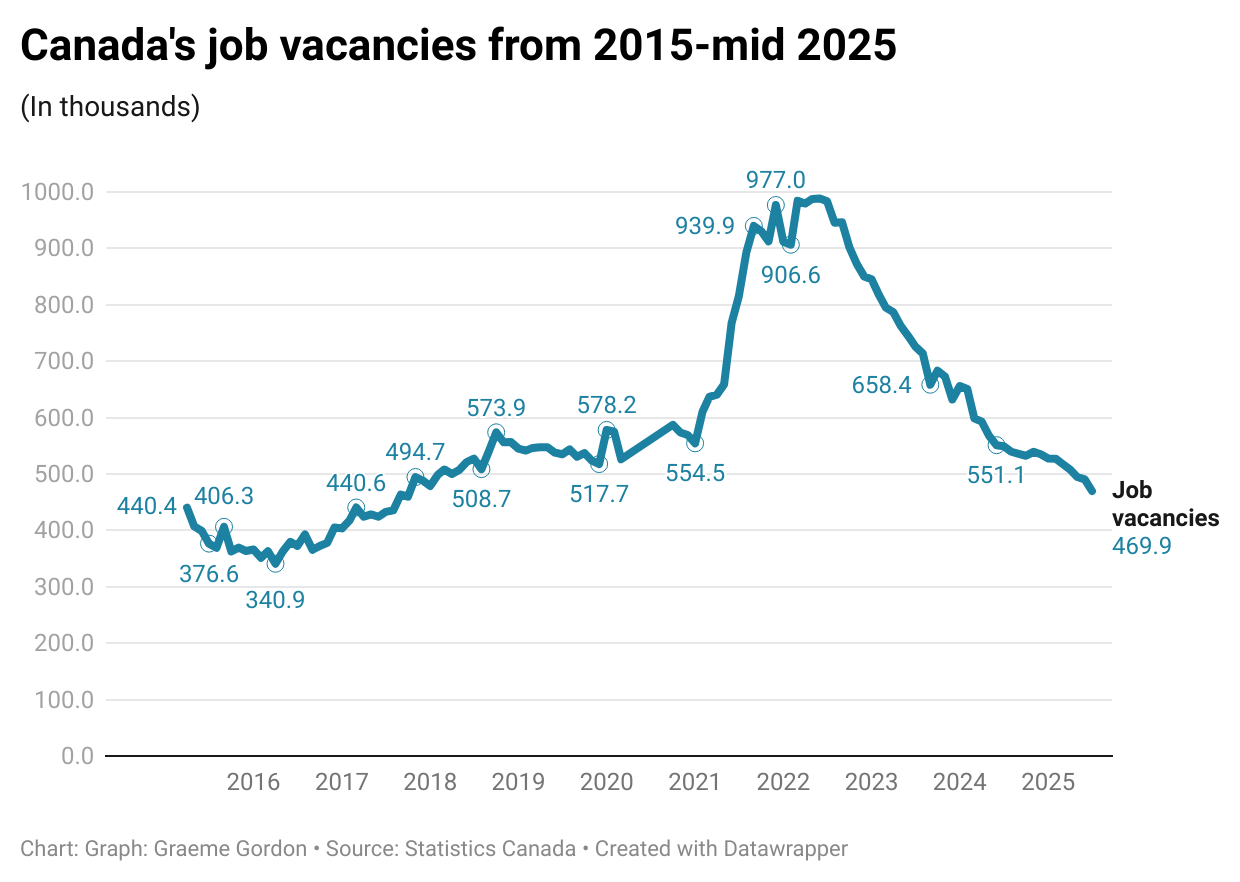The number of job openings in Canada hit an eight-year low this summer, according to new Statistics Canada data, in conjunction with a rise in the country’s unemployment rate, which hit 7.1 percent in August. The drop in job vacancies in July—to under 470,000—hadn’t been that low since October 2017, a period of time where Canada’s population was five million fewer people.
This, along with other indicators, suggests Canada may be on the verge of, or already in, a recession. In July, the job vacancy rate hit 2.6 percent, its lowest level since February 2017. Statistics Canada calculates its job vacancy rate by the number of jobs open as a percentage of the overall labour demand (the total of occupied and vacant jobs).

Economists believe the confluence of an increase in Canada’s unemployed and lower demand for labour is concerning for the country’s economic outlook.
“With the slowdown in employment and the increase in unemployment, it’s not surprising that job vacancies are coming down and are actually…at their lowest level since before the pandemic,” former Statistics Canada chief economist analyst and Fraser Institute senior fellow Philip Cross told The Hub.
A tough job market for unemployed Canadians as more layoffs mount
As the demand for workers wanes, the competition for jobs has become fierce. CBC reported Monday that hundreds of unemployed Canadians were applying for grocery store jobs in Ottawa.
Also at the start of this week, Imperial Oil announced it was eliminating 900 jobs, mostly based in Calgary, continuing a trend of oil and gas job losses. Meanwhile, a General Motors worker spoke out about being one of 2,000 GM workers who are facing job cuts at the start of 2026. The Canadian economy lost a remarkable 66,000 jobs in August.
Job posting search engine Indeed has also seen major shifts in the job market in Canada.
“Compared to pre-pandemic levels, the weakest areas, many with net declines of over 20 percent, are mainly in tech, retail, and sales, as well as the arts, media, and marketing,” Indeed chief economist Brendon Bernard told The Hub.
Last week, the Globe and Mail published a piece revealing that new Canadian-founded tech startups headquartered in Canada declined by more than half in the last decade.
Bernard noted other occupations where new job openings have slowed.
“Several of the sectors that have fared weakest over the past year are in health care, like nursing, and personal care and home health, as well as community and social service, areas that had previously remained elevated compared to cooling demand elsewhere.”
Canada’s ratio of unemployment compared to job vacancies has changed drastically in the last two years.
“Unemployment has risen much faster than job vacancies over the last couple of years; that ratio of unemployment to job vacancies has jumped from one to three, which is a huge movement,” Cross explained. However, the former Statistics Canada chief economist analyst doesn’t think Canada’s latest “weakened” economy is indicative of a recession, at least not yet.
Job recruiting agencies have also noticed a marked decrease in job vacancies, further reflecting Statistics Canada’s report.
“Yes, we’ve seen that overall job vacancies slowed for non-skilled trades between March and August this year,” Toronto-based Pure Staffing Solutions president Brad Semotiuk explained to The Hub.
Youth employment record low another sign of Canada’s economic downturn
The rate of youth employment (ages 15 to 24) hit a low-water mark of 53.6 percent this summer, the lowest level since 1998, excluding the pandemic.
“We’ve also seen over the last decade a huge drop in youth participation rates. And what’s driving that…employment prospects for youth are abysmal…[and] on the one hand, higher minimum wages [could deter hiring], and on the other hand, this major influx of temporary foreign workers,” Cross explained.
But Mikal Skuterud, a labour economist at the University of Waterloo, doesn’t believe the uptick in youth unemployment in Canada is mainly driven by competition from foreign students and workers.
“This summer, international student inflows and the stock population of international students that are here have plummeted. Plummeted. [Meanwhile] youth unemployment is accelerating,” Skuterud told The Hub.
Skuterud sees youth unemployment increasing as a warning sign that the overall economy is in a cooling period.
“It’s the same thing that happens every time. It’s a business cycle. Go back in history and look at what happens to youth unemployment rates compared to unemployment rates of other groups in the population as an economy goes into a downturn,” Skuterud explained.
“Overwhelmingly, people are not losing their jobs. The reason unemployment rates go up is because job vacancies, job creation, slows down, so there’s fewer job openings. And who’s affected by that the most? It’s the new labor market entrance. The people who are entering the labor market looking for their first job.”
Alberta’s stronger job market is a bright spot
Despite provinces like Ontario especially suffering from job losses and a drying up of job openings, Alberta continues to have a relatively strong economy.
“Given the slowdown in the overall economy…Alberta’s employment growth at 2 percent is exceptionally good,” Cross explained, adding that the province also has “phenomenal” 3.2 percent growth. “There’s a mismatch between where [job seekers are, compared to where the jobs are] in this country. People just can’t move that fast and in the short term, it produces this disconnect.”
Cross believes beyond economics, social variables, such as the word getting out about cheaper cost of living, have been a major draw for young people to move to the wild rose province.
“Housing affordability is a major reason for discouraging young people and immigrants from going to Vancouver and Toronto and to seek out other areas of the country,” Cross said.












